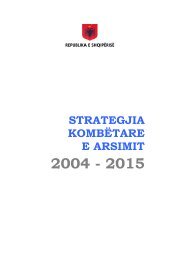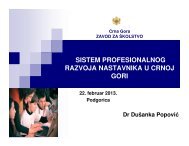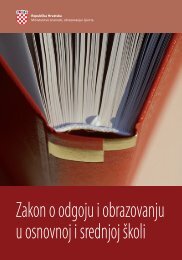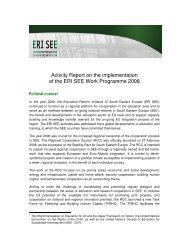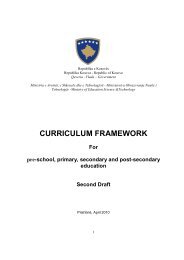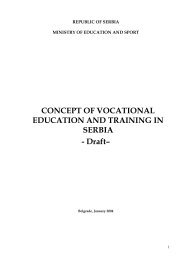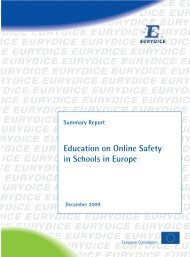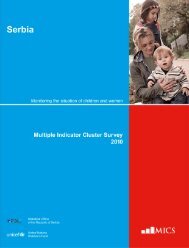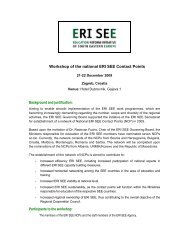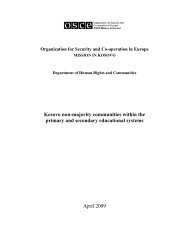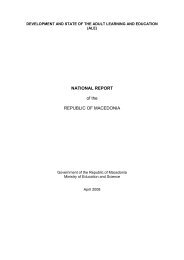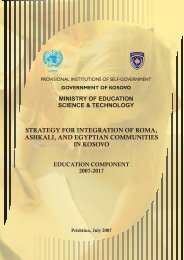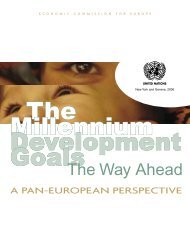Main challenges to adult learning in Montenegro - ERI SEE
Main challenges to adult learning in Montenegro - ERI SEE
Main challenges to adult learning in Montenegro - ERI SEE
Create successful ePaper yourself
Turn your PDF publications into a flip-book with our unique Google optimized e-Paper software.
The contents of this paper are the sole responsibilityof the authors and do not necessarily reflect the viewsof the ETF or the EU <strong>in</strong>stitutions.© European Tra<strong>in</strong><strong>in</strong>g Foundation, 2011Reproduction is authorised provided the sourceis acknowledged.
MAIN CHALLENGES TOADULT LEARNINGIN MONTENEGROPREPARED FOR THE ETF BY GORDANA BOSKOVIĆAND LJILJANA GARIĆMarch, 20111. INTRODUCTION ..................................................................................................... 22. LEGAL AND INSTITUTIONAL FRAMEWORK FOR DEVELOPING ADULTEDUCATION............................................................................................................ 43. KEY ISSUES IN ADULT LEARNING...................................................................... 54. ELEMENTARY FUNCTIONAL LITERACY PROGRAMME.................................... 85. CURRENT CHALLENGES AND CONCLUSIONS ............................................... 12REFERENCE.................................................................................................................. 14
21. INTRODUCTIONEconomic transition <strong>in</strong> <strong>Montenegro</strong> caused the disappearance of companies that previouslyemployed a large number of people with vary<strong>in</strong>g levels of education and skills. Consequently, theunemployment rate <strong>in</strong>creased. Much of the previously acquired knowledge, and many skills andcompetences became obsolete. The Employment Agency of <strong>Montenegro</strong> tries <strong>to</strong> enhance<strong>in</strong>dividuals’ employability by offer<strong>in</strong>g professional tra<strong>in</strong><strong>in</strong>g, retra<strong>in</strong><strong>in</strong>g and upskill<strong>in</strong>g opportunities.Accord<strong>in</strong>g <strong>to</strong> the latest census from 2003, the official number of illiterate people <strong>in</strong> <strong>Montenegro</strong> is12,617 or 2.35% of the population. However, if one considers the def<strong>in</strong>ition of literacy, the actualnumber of illiterate people is higher. In <strong>Montenegro</strong>, literacy is generally associated with basiceducation and key competences. Functional literacy is regarded as literacy for the 21st centuryand implies comprehensive knowledge and skills that help <strong>in</strong>dividuals understand natural andsocial processes and allow them <strong>to</strong> respond actively <strong>to</strong> them. It implies knowledge of keycompetences such as foreign languages, entrepreneurship, IT and other technologies, and avalue system that is based on susta<strong>in</strong>able development and lifelong <strong>learn<strong>in</strong>g</strong>. Tra<strong>in</strong><strong>in</strong>g is offered <strong>in</strong>these competences and those who succeed <strong>in</strong> master<strong>in</strong>g them receive a certificate.The traditional education system was geared ma<strong>in</strong>ly <strong>to</strong>wards knowledge rather than skills, whilecompetences hardly featured at all. Given the large number of people who did not complete basiceducation, achiev<strong>in</strong>g the level of literacy mentioned above will prove <strong>to</strong> be a challenge.The general education goals for both young people and <strong>adult</strong>s <strong>in</strong> <strong>Montenegro</strong> are:• <strong>to</strong> acquire professional and general functional knowledge, skills and competences <strong>to</strong> allowpeople <strong>to</strong> enter the labour market and become useful members of society;• <strong>to</strong> f<strong>in</strong>d employment or keep exist<strong>in</strong>g jobs through cont<strong>in</strong>uous professional development.Educational <strong>in</strong>stitutions, <strong>in</strong> cooperation with other public <strong>in</strong>stitutions and local self-governmentbodies, are charged with creat<strong>in</strong>g the conditions for meet<strong>in</strong>g these <strong>challenges</strong>. With<strong>in</strong> the scope oftheir activities, the M<strong>in</strong>istry of Education and Science, the Centre for Vocational Education, theBureau for Educational Services, the Exam<strong>in</strong>ations Centre and other relevant <strong>in</strong>stitutions try <strong>to</strong>ensure equal access <strong>to</strong> education for both young people and <strong>adult</strong>s. This <strong>in</strong>volves <strong>in</strong>clud<strong>in</strong>gpeople with special needs, adapt<strong>in</strong>g tra<strong>in</strong><strong>in</strong>g programmes and teach<strong>in</strong>g methods <strong>to</strong> the needs andcapabilities of learners and deliver<strong>in</strong>g high-quality knowledge, skills and competences. The latter<strong>in</strong> turn requires high-calibre tra<strong>in</strong><strong>in</strong>g programmes, well-tra<strong>in</strong>ed teachers, relevant <strong>learn<strong>in</strong>g</strong>contents, suitable didactic materials and <strong>learn<strong>in</strong>g</strong> conditions.S<strong>in</strong>ce education reform began <strong>in</strong> 1999, the quality of work by educational <strong>in</strong>stitutions hasimproved considerably. In recent years, the Centre for Vocational Education has made asignificant contribution <strong>to</strong> developments <strong>in</strong> education and tra<strong>in</strong><strong>in</strong>g for both young people and<strong>adult</strong>s. The centre was set up accord<strong>in</strong>g <strong>to</strong> the pr<strong>in</strong>ciples of social partnership and is responsiblefor carry<strong>in</strong>g out developmental, advisory, research and technical tasks.The centre develops occupational standards subject <strong>to</strong> an analysis of labour market needs forcerta<strong>in</strong> profiles. Tra<strong>in</strong><strong>in</strong>g programmes 1 are elaborated on the basis of these standards. Theprogrammes are then adopted by the Council for Adult Education. Tra<strong>in</strong><strong>in</strong>g programmes conta<strong>in</strong>clearly def<strong>in</strong>ed and easily measurable <strong>learn<strong>in</strong>g</strong> outcomes <strong>to</strong> be achieved by tra<strong>in</strong>ees at the end ofthe programme. At the time of writ<strong>in</strong>g, the council had adopted 63 job-oriented programmes1 In the Montenegr<strong>in</strong> system we dist<strong>in</strong>guish between ‘curricula’ – a term that refers <strong>to</strong> programmes used <strong>in</strong> the formal education system –and ‘tra<strong>in</strong><strong>in</strong>g programmes’. The latter are typically shorter and used for <strong>adult</strong> <strong>learn<strong>in</strong>g</strong>; they may focus on a number of areas <strong>in</strong>clud<strong>in</strong>gprofessional qualification, pre-qualification, additional qualification and upskill<strong>in</strong>g.
(lead<strong>in</strong>g <strong>to</strong> a qualification) and 33 programmes focused on the acquisition of additionalknowledge, skills or key competences (not lead<strong>in</strong>g <strong>to</strong> a qualification). The Centre for VocationalEducation has prepared more programmes and these are currently await<strong>in</strong>g adoption. Draft<strong>in</strong>gsuch programmes <strong>in</strong> l<strong>in</strong>e with labour market and employers’ needs is a cont<strong>in</strong>uous process.3
42. LEGAL AND INSTITUTIONALFRAMEWORK FOR DEVELOPINGADULT EDUCATIONAdult education <strong>in</strong> <strong>Montenegro</strong> is an <strong>in</strong>tegral part of the education system. The field is governedby the General Law on Education 2 and the Law on Adult Education 3 , as well as a number of otherlaws (rulebooks). The Strategy for Adult Education <strong>in</strong> <strong>Montenegro</strong> for the period 2005–15 providesguidance for <strong>adult</strong> education development. The Adult Education Action Plan for the period 2010–14, which has been derived from the strategy, def<strong>in</strong>es priority areas, objectives, and tasks <strong>in</strong> moredetail. An annual Action Plan implements the strategy and the plan.Adult <strong>learn<strong>in</strong>g</strong> <strong>in</strong> <strong>Montenegro</strong> is based on a lifelong <strong>learn<strong>in</strong>g</strong> concept, which is def<strong>in</strong>ed as acont<strong>in</strong>u<strong>in</strong>g <strong>learn<strong>in</strong>g</strong> activity aimed at improv<strong>in</strong>g knowledge, skills and competences. As one of thecentral pr<strong>in</strong>ciples of EU policy, lifelong <strong>learn<strong>in</strong>g</strong> <strong>in</strong> <strong>Montenegro</strong> is considered <strong>to</strong> be extremelyimportant and the basic strategy for socio-economic growth and <strong>in</strong>dividual wellbe<strong>in</strong>g. Educationand <strong>learn<strong>in</strong>g</strong> is not just about prepar<strong>in</strong>g for life, but is also an important aspect of life <strong>in</strong> a modernsociety. As such, the role of the Adult Education department at the Centre for VocationalEducation is <strong>to</strong> develop <strong>adult</strong> education by:• ensur<strong>in</strong>g cont<strong>in</strong>uous <strong>learn<strong>in</strong>g</strong> with the aim of acquir<strong>in</strong>g and improv<strong>in</strong>g knowledge, skills andcompetences;• rais<strong>in</strong>g awareness of the importance of <strong>in</strong>vest<strong>in</strong>g <strong>in</strong> human resources;• acknowledg<strong>in</strong>g non-formally or <strong>in</strong>formally acquired knowledge and skills and their l<strong>in</strong>ks withthe formal educational system;• us<strong>in</strong>g appropriate <strong>adult</strong> education methods;• establish<strong>in</strong>g a quality system <strong>in</strong> <strong>adult</strong> <strong>learn<strong>in</strong>g</strong>;• provid<strong>in</strong>g quality <strong>in</strong>formation and counsell<strong>in</strong>g on lifelong <strong>learn<strong>in</strong>g</strong> opportunities;• ensur<strong>in</strong>g the availability of education and <strong>learn<strong>in</strong>g</strong> for all citizens;• develop<strong>in</strong>g a variety of educational services for all population groups.2 Official Gazette of the Republic of <strong>Montenegro</strong> No 64/02 and amendments <strong>to</strong> the law <strong>in</strong> the Official Gazette of the Republic of <strong>Montenegro</strong>Nos 31/05 and 49/07.3 Official Gazette of the Republic of <strong>Montenegro</strong> No 64/02 and amendments <strong>to</strong> the law <strong>in</strong> the Official Gazette of the Republic of <strong>Montenegro</strong>No 49/07.
62 July 6 – July 19, 2013 Artswww.SanTanSun.comCenter performances <strong>in</strong>clude New<strong>to</strong>n, MontgomeryTickets are on sale for the 2013-14performances at the Higley Center forthe Perform<strong>in</strong>g Arts, which will featurean array of performers <strong>in</strong>clud<strong>in</strong>g theCeltic band Solas, pop-and-country starJuice New<strong>to</strong>n, and country musician JohnMichael Montgomery.Tickets for some of the follow<strong>in</strong>gshows at the Higley Center for thePerform<strong>in</strong>g Arts range from $21 <strong>to</strong> $45and can be purchased through a securel<strong>in</strong>k onl<strong>in</strong>e at higleyarts.org, by call<strong>in</strong>g480-279-7194, or by visit<strong>in</strong>g the HCPABox Office at 4132 E. Pecos Road, Gilbert,AZ, 85295. The office is open dur<strong>in</strong>g thesummer from 8:30 a.m. <strong>to</strong> 4 p.m. Mondaythrough Thursday.The 2013-14 l<strong>in</strong>eup:• Sat., Sept. 7, at 2 p.m. and at 7:30p.m.: Magician Eric Giliam willshowcase his award w<strong>in</strong>n<strong>in</strong>gmagic and illusions <strong>in</strong> thisthrill<strong>in</strong>g, all ages show.• Sat., Sept. 13, at 8 p.m.: Irish bandSolas performs a multimediastage show, The Shamrock CityTour. Jo<strong>in</strong> bandleader SeamusEgan as he takes you on theunforgettable journey of hisgreat-great uncle MichaelConway’s life <strong>in</strong> Ireland andmysterious death <strong>in</strong> America.• Sat., Oct. 19, at 8 p.m.: ArtistJonathan Edwards performssongs of passion, songs of<strong>in</strong>sight, songs of humor—allrendered <strong>in</strong> a pure and powerfultenor voice.• Sun., Oct. 20, at 3 p.m.: TheAmerican-roots band Mrs.L<strong>in</strong>coln performs rock, country,bluegrass and rhythm and blues.• Sat., Nov. 16, at 7 p.m.: Grammyw<strong>in</strong>n<strong>in</strong>gartist Juice New<strong>to</strong>n andthe band Exile perform someof their No. 1 Billboard hits andother songs.• Sat., Nov. 23, at 7 p.m.: Ina hilarious spoof of TV’s“The Newlyweds Game,”“Bob Eubanks <strong>in</strong> The Not SoNewlywed Game,” follows theorig<strong>in</strong>al format of the televisionshow us<strong>in</strong>g four married coupleswho are either newlyweds orfeel like newlyweds.• Fri., Dec. 6, at 8 p.m.: The Bl<strong>in</strong>dBoys of Alabama performholiday songs and hymns.• Sun., Jan. 5, at 3 p.m.: The awardw<strong>in</strong>n<strong>in</strong>gs<strong>in</strong>ger and songwriter,C. Daniel Bol<strong>in</strong>g, performssongs <strong>in</strong>habited by <strong>in</strong>terest<strong>in</strong>gcharacters drawn from his life,<strong>in</strong>clud<strong>in</strong>g a vagabond who ranoff with a t<strong>in</strong>y circus <strong>to</strong> <strong>to</strong>urthe West, and an ag<strong>in</strong>g Vietnamveteran reflect<strong>in</strong>g on hisdeparted youth.• Sat., Jan. 11, at 7 p.m.: Knownfor songs such as “I’m In<strong>to</strong>Someth<strong>in</strong>g Good” and “Mrs.Brown, You’ve Got A LovelyDaughter,” Herman’s Hermitsstarr<strong>in</strong>g Peter Noone performsthis night with a specialappearance by another star,Melanie, whose novelty song,“Brand New Key,” became a bighit <strong>in</strong> 1971.• Fri., Jan. 24, at 7 p.m.: Navajo-Ute-born, R. Carlos Nakai, is anaward-w<strong>in</strong>n<strong>in</strong>g Native Americanflute player who performs withThe Carlos Nakai Trio, which<strong>in</strong>cludes artists Will Clipman andWilliam Ea<strong>to</strong>n.• Sat., Jan. 25, at 8 p.m.: A cappellagroup and Las Vegas stars, TheAlley Cats, s<strong>in</strong>g doo-wop.• Sat., Feb. 1, at 7 p.m.: Awardw<strong>in</strong>n<strong>in</strong>gKentucky-born countrys<strong>in</strong>ger John Michael Montgomeryperforms.• Sun, Feb. 9, at 3 p.m.: The Alaskanfiddler, Ken Waldman, comb<strong>in</strong>esAppalachian-style str<strong>in</strong>g musicwith his poetry and s<strong>to</strong>rytell<strong>in</strong>g.• Fri., Feb. 14, at 8 p.m.; Theheadl<strong>in</strong>e act for the Gilbert FolkFestival, John Denver sound-alikeJim Curry performs his “Take MeHome” show, a tribute <strong>to</strong> thelate John Denver.• Sat., March 1, at 7 p.m.: ArtistsJoe Bethancourt, Jim Pipk<strong>in</strong> andL<strong>in</strong>da Bilque perform “One GreatNight of Folk Music.”• Sun., March 2, at 7 p.m.: RedMolly, an all-women’s a cappellatrio, has been <strong>to</strong>pp<strong>in</strong>g theAmericana charts and record<strong>in</strong>gaward-w<strong>in</strong>n<strong>in</strong>g albums, “NeverBeen <strong>to</strong> Vegas” and “Love andOther Tragedies.”• Sat., March 8, at 8 p.m.: Melaniemade her mark <strong>in</strong> the musicworld at Woods<strong>to</strong>ck and becameknown for songs such as “BrandNew Key” and “Beautiful People.”• Sat., March 15, 7 p.m.: RickyNelson’s tw<strong>in</strong> sons, Matthewand Gunnar Nelson, put on amultimedia event and tribute <strong>to</strong>their famous s<strong>in</strong>ger-songwriterfather.• Sun., March 16, 3 p.m.: Guitjoplayer Joe Scott and cellistHannah Alkire have comb<strong>in</strong>edtheir talents <strong>to</strong> form the <strong>to</strong>ur<strong>in</strong>gacoustic duet, Acoustic Eidolon.• Fri. March 28, 8 p.m.: “LUMA” isa show of unseen performersproduc<strong>in</strong>g a swirl<strong>in</strong>g tapestry oflight that is constantly <strong>in</strong> motionwhile depict<strong>in</strong>g the light we see<strong>in</strong> our lives.• Sat., March 29, 7 p.m.: FiddlerRyan Shupe and the RubberBandemerged from Ogden, Utah, <strong>in</strong>the 1990s as a bluegrass band.• Sun., March 30, 3 p.m.: Arizonanative LeeLee Robert plays her“cowgirl jazz.” Her recent album,“Western Stars,” placed No. 18 onthe Top 30 for cowboy/Westernalbums.$3 OFF—Any Surgery—With coupon only.Valid only at Chandler location.Expires 7/31/2013Spay Neuter Cl<strong>in</strong>icAFFORDABLE VET<strong>ERI</strong>NARY CAREBY DR. SARA KOEHNServices by Appo<strong>in</strong>tment: Spay and Neuter,Vacc<strong>in</strong>ations, Dental Clean<strong>in</strong>g,Microchipp<strong>in</strong>g, Leukemia Test<strong>in</strong>g,Heartworm Test<strong>in</strong>g and Preventative$28.......Cat Neuter$47.......Cat Spay$59.......Dog Neuter (
7Due <strong>to</strong> a lack of funds, considerable methodological work still has <strong>to</strong> be undertaken with a view <strong>to</strong>adapt<strong>in</strong>g tra<strong>in</strong><strong>in</strong>g programmes for people with special needs and other vulnerable groups.Data collection and researchThe further development of <strong>adult</strong> education <strong>in</strong> <strong>Montenegro</strong> depends heavily on research andsuitable data. Such data is currently not available. Apart from the fact that the lack of reliable dataprecludes a systematic approach, it hampers plann<strong>in</strong>g at a national level. The lack of <strong>in</strong>formationon the numerous tra<strong>in</strong><strong>in</strong>g activities carried out with<strong>in</strong> private companies means that the result<strong>in</strong>gpicture of <strong>adult</strong> <strong>learn<strong>in</strong>g</strong> may not be complete. The basic conditions for conduct<strong>in</strong>g research arenot <strong>in</strong> place, aga<strong>in</strong> due <strong>to</strong> a lack of funds.No system exists for moni<strong>to</strong>r<strong>in</strong>g the impact of tra<strong>in</strong><strong>in</strong>g on the professional development and careerof graduates.Regional balanceAnother problem is the imbalance <strong>in</strong> educational offer<strong>in</strong>gs <strong>in</strong> different Montenegr<strong>in</strong> regions. Whilea good network of <strong>adult</strong> tra<strong>in</strong><strong>in</strong>g providers exists <strong>in</strong> the central region, network developmentrema<strong>in</strong>s poor <strong>in</strong> the south and non-existent <strong>in</strong> the north.
84. ELEMENTARY FUNCTIONALLITERACY PROGRAMMEOne of the aims of <strong>adult</strong> <strong>learn<strong>in</strong>g</strong> is <strong>to</strong> achieve universal basic education, which, accord<strong>in</strong>g <strong>to</strong><strong>Montenegro</strong>’s constitution, is compulsory and free.The illiteracy problem is especially widespread among both the settled and travell<strong>in</strong>g Romapopulation <strong>in</strong> <strong>Montenegro</strong>. Research shows that 80% of the Roma population are illiterate, themajority be<strong>in</strong>g women (Zeković and Delić, 2008) 4 . The start<strong>in</strong>g po<strong>in</strong>t for completely illiteratepeople is elementary functional literacy. Apart from basic l<strong>in</strong>guistic and mathematical literacy, this<strong>in</strong>volves basic life skills or the m<strong>in</strong>imum knowledge and skills required <strong>to</strong> successfully masterwork, family and social life. These skills may then be developed and improved further.The Centre for Vocational Education prepared an elementary functional literacy programme whichwas adopted by the Council for Adult Education <strong>in</strong> 2006.It consists of six subject areas:• basic l<strong>in</strong>guistic literacy <strong>in</strong> the Montenegr<strong>in</strong> mother <strong>to</strong>ngue (for programmes conducted <strong>in</strong>Albanian, additional classes are envisaged <strong>in</strong> Montenegr<strong>in</strong> as a non-native language);• mathematical literacy;• education for parents and families, <strong>in</strong>clud<strong>in</strong>g basic health education;• environmental education;• education for life <strong>in</strong> the community;• functional skills.More specifically, basic l<strong>in</strong>guistic literacy <strong>in</strong> the mother <strong>to</strong>ngue (150 lessons) covers tra<strong>in</strong><strong>in</strong>g aimedat:• understand<strong>in</strong>g and be<strong>in</strong>g able <strong>to</strong> express oneself orally and <strong>in</strong> writ<strong>in</strong>g;• read<strong>in</strong>g and writ<strong>in</strong>g the Cyrillic alphabet;• read<strong>in</strong>g and writ<strong>in</strong>g the Lat<strong>in</strong> alphabet;• know<strong>in</strong>g basic l<strong>in</strong>guistic and grammar rules, ga<strong>in</strong><strong>in</strong>g a higher level of cultural awareness andbecom<strong>in</strong>g more articulate <strong>in</strong> one’s mother <strong>to</strong>ngue.Depend<strong>in</strong>g on the structure of student groups, the option of acquir<strong>in</strong>g elementary literacy <strong>in</strong> thelanguage of other ethnic or national groups should also be offered (72 lessons).Mathematical literacy (120 lessons) implies the knowledge, understand<strong>in</strong>g and use of card<strong>in</strong>alnumbers up <strong>to</strong> 1,000. Students practise add<strong>in</strong>g, subtract<strong>in</strong>g, multiply<strong>in</strong>g and divid<strong>in</strong>g values. Theyalso deal with ord<strong>in</strong>al numbers, percentages, units of measure for length, weight and time andbasic geometrical forms and figures. Mathematical literacy also covers everyday tasks, such asmanag<strong>in</strong>g household budgets, compar<strong>in</strong>g prices, understand<strong>in</strong>g weights and measures anddeal<strong>in</strong>g with travel-related issues such as currencies and time differences.The family education programme, where participants can learn about basic health, parenthoodand family life, comprises 20 lessons. This programme covers the concept and development4 Additional data on Roma and Egyptian people is available on the websites of the Employment Agency of <strong>Montenegro</strong> (www.zzzcg.org) andthe Roma Scholarship Foundation – Institute of Social Inclusion (www.isi-mne.org).
9phases of a family, basic rights and obligations of family members, family relations and decisionmak<strong>in</strong>gtechniques, family needs, basic problems relat<strong>in</strong>g <strong>to</strong> family life and strategies on how <strong>to</strong>overcome them, conflict resolution and family plann<strong>in</strong>g. Health education addresses health risks,health protection and promotion, personal hygiene, nutrition (vitam<strong>in</strong>s, foodstuffs and their correctpreparation), first aid, symp<strong>to</strong>ms of basic diseases and the appropriate response. It also highlightsthe <strong>in</strong>stitutional and social support that is available <strong>in</strong> the event of health problems.Environmental education (10 lessons) deals with elementary natural phenomena such as air, light,water and climate, but also herbs and their significance for human be<strong>in</strong>gs. It also coversenvironmental pollution and its impact on human health. This module raises awareness ofenvironmental problems and the need <strong>to</strong> develop a responsible attitude <strong>to</strong>wards nature and <strong>to</strong>help protect it.Education for life <strong>in</strong> the community (10 lessons) helps people understand the system of social<strong>in</strong>stitutions, basic civic rights and obligations and how life is organised <strong>in</strong> the community. It<strong>in</strong>cludes the hierarchy of <strong>in</strong>stitutions and how requests, documents and forms are submitted <strong>to</strong>them. The aim of this module is <strong>to</strong> emphasise how human rights are universal and <strong>in</strong>divisible forall people, regardless of their material situation, social status, colour, place of residence,nationality or religion and <strong>to</strong> help people exercise their rights and civil freedoms.Functional skills cover basic <strong>in</strong>formation literacy (20 lessons). Participants learn how <strong>to</strong> useeveryday modern technology such as cash mach<strong>in</strong>es and the means of mass communication.The duration of the programme depends on the needs of the target group. However, it cannot beshorter than 20 weeks <strong>in</strong> <strong>to</strong>tal.Upon completion of the elementary functional literacy programme, participants get a certificatethat is equivalent <strong>to</strong> one that would be awarded on completion of the first cycle (third grade) of then<strong>in</strong>e-year elementary school system. After that, participants have the opportunity <strong>to</strong> cont<strong>in</strong>ue withthe <strong>adult</strong> elementary education programme, which is conducted at workers’ or public universities.Alternatively, <strong>adult</strong>s can enrol <strong>in</strong> a vocational education programme that qualifies them <strong>to</strong> enterthe labour market at a lower skills level (level 2).Implement<strong>in</strong>g a pilot programmeAt the end of 2007/beg<strong>in</strong>n<strong>in</strong>g of 2008, the elementary functional literacy programme was carriedout on a pilot basis with<strong>in</strong> the framework of the EU-f<strong>in</strong>anced Second Chance project. Onlylicensed <strong>adult</strong> tra<strong>in</strong><strong>in</strong>g providers were allowed <strong>to</strong> participate. Target beneficiaries were Roma andEgyptians liv<strong>in</strong>g <strong>in</strong> Nikšić and Podgorica who had never attended primary school or hadcompleted less than four grades of primary school.All phases of the Second Chance project (2007/08) – and later also the Integration of M<strong>in</strong>orityGroups <strong>in</strong> South-eastern Europe project (2009/10, see below) – were well advertised by themedia. The Centre for Vocational Education also promoted the projects, and their results, at theAdult Learn<strong>in</strong>g Festival.Ten assistants who had completed secondary education themselves were recruited from theRoma community and were key figures <strong>in</strong> motivat<strong>in</strong>g and support<strong>in</strong>g students. Incentives forcourse enrolment <strong>in</strong>cluded monthly allowances for students and the possibility of enter<strong>in</strong>g tra<strong>in</strong><strong>in</strong>gprogrammes for occupations at a lower skills level once they had completed the elementaryfunctional literacy programme.Six groups of students were established, 40% of whom were women. All students attended theprogramme for the same duration. Extra classes were organised and the Roma assistantsprovided <strong>learn<strong>in</strong>g</strong> support. Of the 88 participants who started the course, 67 met the requirements
11teach<strong>in</strong>g of <strong>adult</strong>s <strong>in</strong>clude the acceptance of the <strong>adult</strong>s’ experience <strong>in</strong> the <strong>learn<strong>in</strong>g</strong> process and theadaptation of <strong>learn<strong>in</strong>g</strong> contents, work<strong>in</strong>g methods, time, place and other conditions <strong>to</strong> the needs of<strong>adult</strong> learners.The Centre for Vocational Education prepared a tra<strong>in</strong><strong>in</strong>g programme for teachers work<strong>in</strong>g <strong>in</strong> <strong>adult</strong>education. The Council for Adult Education adopted the programme, which consists of sevenmodules. Six of them have been developed, while the conditions for implement<strong>in</strong>g the seventhmodule (on distance <strong>learn<strong>in</strong>g</strong>) are still not <strong>in</strong> place.The modules <strong>in</strong>clude:• the specifics of <strong>adult</strong> <strong>learn<strong>in</strong>g</strong>, <strong>in</strong>clud<strong>in</strong>g lifelong <strong>learn<strong>in</strong>g</strong>, how <strong>adult</strong>s develop knowledge andlearn, socio-psychological fac<strong>to</strong>rs, motives for and barriers <strong>to</strong> <strong>adult</strong> <strong>learn<strong>in</strong>g</strong>;• communications <strong>in</strong> <strong>adult</strong> <strong>learn<strong>in</strong>g</strong>, <strong>in</strong>clud<strong>in</strong>g characteristics, elements and forms ofcommunication, barriers <strong>to</strong> communication, conflicts and techniques <strong>to</strong> resolve them,<strong>in</strong>terrelation and <strong>in</strong>teraction between teachers and students, enabl<strong>in</strong>g <strong>adult</strong>s <strong>to</strong> communicate;• organisation, plann<strong>in</strong>g and programm<strong>in</strong>g <strong>in</strong> <strong>adult</strong> <strong>learn<strong>in</strong>g</strong>;• facilitation of the <strong>learn<strong>in</strong>g</strong> process and group dynamics <strong>in</strong>clud<strong>in</strong>g visualisation and visualmedia, presentations, facilitation and relevant techniques, the role of facilita<strong>to</strong>rs, groupdynamics, teams and team work;• <strong>adult</strong> <strong>learn<strong>in</strong>g</strong> methods, <strong>in</strong>clud<strong>in</strong>g special <strong>adult</strong> <strong>learn<strong>in</strong>g</strong> methods and criteria for their selectionand use;• evaluation and self-evaluation, <strong>in</strong>clud<strong>in</strong>g the basic concepts and characteristics of evaluation,evaluation plans and processes, evaluation as part of the <strong>learn<strong>in</strong>g</strong> process, evaluation of theteach<strong>in</strong>g/tra<strong>in</strong><strong>in</strong>g, evaluation of the <strong>in</strong>stitution, educational <strong>in</strong>dica<strong>to</strong>rs and standards, selfevaluation;• modern <strong>adult</strong> <strong>learn<strong>in</strong>g</strong> models, <strong>in</strong>clud<strong>in</strong>g counsell<strong>in</strong>g of <strong>adult</strong>s, use of contemporary ICTs, selfguided<strong>learn<strong>in</strong>g</strong>, options <strong>in</strong> <strong>adult</strong> <strong>learn<strong>in</strong>g</strong>, characteristics and alternative forms of <strong>adult</strong><strong>learn<strong>in</strong>g</strong>.Challenges fac<strong>in</strong>g the literacy programmeOne of the ma<strong>in</strong> <strong>challenges</strong> is the creation of a cohort of well-tra<strong>in</strong>ed <strong>adult</strong> education tra<strong>in</strong>ers whocan implement the relevant courses <strong>in</strong> accordance with the pr<strong>in</strong>ciples underly<strong>in</strong>g the teach<strong>in</strong>g of<strong>adult</strong>s and didactic and methodological recommendations. In order <strong>to</strong> achieve this aim, fund<strong>in</strong>g isessential <strong>to</strong> ensure the ongo<strong>in</strong>g implementation of programmes.The Centre for Vocational Education recognises the need <strong>to</strong> extend the number of educationaloffer<strong>in</strong>gs and create the conditions for their availability <strong>to</strong> all Montenegr<strong>in</strong> citizens. It <strong>in</strong>tends <strong>to</strong>adopt programmes that will be implemented by licensed <strong>adult</strong> tra<strong>in</strong><strong>in</strong>g providers, thus ensur<strong>in</strong>gquality.An <strong>in</strong>ven<strong>to</strong>ry of illiterate people and people who have received tra<strong>in</strong><strong>in</strong>g would help us moni<strong>to</strong>rprogress.
125. CURRENT CHALLENGES ANDCONCLUSIONSIn summary, we would advise the follow<strong>in</strong>g actions <strong>to</strong> help address the current <strong>challenges</strong> fac<strong>in</strong>g<strong>adult</strong> <strong>learn<strong>in</strong>g</strong> <strong>in</strong> <strong>Montenegro</strong>:• extend the number of educational offer<strong>in</strong>gs by prepar<strong>in</strong>g a variety of shorter programmes <strong>to</strong>enable more citizens <strong>to</strong> avail of education and tra<strong>in</strong><strong>in</strong>g that suit their needs and capabilities;• develop key competences by embedd<strong>in</strong>g them <strong>in</strong> both school curricula and non-formaltra<strong>in</strong><strong>in</strong>g programmes;• tra<strong>in</strong> and facilitate the professional development of teachers;• create the conditions for the assessment, validation and recognition of non-formally or<strong>in</strong>formally acquired knowledge, skills and competences, as provided for by the Law onNational Vocational Qualifications;• ensure that citizens are better <strong>in</strong>formed and advised on the opportunities for education and<strong>learn<strong>in</strong>g</strong> <strong>in</strong> <strong>Montenegro</strong>;• promote lifelong <strong>learn<strong>in</strong>g</strong> through various activities and events, such as <strong>adult</strong> <strong>learn<strong>in</strong>g</strong>festivals.It is also important <strong>to</strong> work on the follow<strong>in</strong>g:• prepar<strong>in</strong>g a methodology for adapt<strong>in</strong>g both exist<strong>in</strong>g curricula for young people and <strong>adult</strong>tra<strong>in</strong><strong>in</strong>g programmes <strong>to</strong> the needs of socially disadvantaged groups and disabled people anddevelop<strong>in</strong>g new programmes <strong>in</strong> l<strong>in</strong>e with labour market needs;• modularis<strong>in</strong>g curricula <strong>in</strong> vocational education <strong>to</strong> ensure that a certa<strong>in</strong> educational level isgradually atta<strong>in</strong>ed, especially by socially disadvantaged groups and disabled people;• creat<strong>in</strong>g the material, technical and other conditions for different forms (formal, non-formal or<strong>in</strong>formal) of education and tra<strong>in</strong><strong>in</strong>g for disabled people and people from sociallydisadvantaged groups so that they can atta<strong>in</strong> a higher standard of education, obta<strong>in</strong>employment and <strong>in</strong>tegrate <strong>in</strong><strong>to</strong> society;• design<strong>in</strong>g and develop<strong>in</strong>g didactic materials and teach<strong>in</strong>g aids;• sett<strong>in</strong>g a deadl<strong>in</strong>e by which all <strong>adult</strong> tra<strong>in</strong><strong>in</strong>g providers should have passed the licens<strong>in</strong>gprocess for engag<strong>in</strong>g <strong>in</strong> <strong>adult</strong> education;• strengthen<strong>in</strong>g the network of tra<strong>in</strong><strong>in</strong>g providers and establish<strong>in</strong>g a database of providers andtra<strong>in</strong><strong>in</strong>g programmes;• creat<strong>in</strong>g the conditions necessary for the development of systematic and theme-basedresearch <strong>in</strong> the field of <strong>adult</strong> education;• establish<strong>in</strong>g mechanisms for moni<strong>to</strong>r<strong>in</strong>g the tra<strong>in</strong><strong>in</strong>g activities of companies;• diversify<strong>in</strong>g tra<strong>in</strong><strong>in</strong>g programmes and tra<strong>in</strong><strong>in</strong>g types;• assign<strong>in</strong>g a major role, <strong>in</strong> accordance with legal provisions, <strong>to</strong> local self-government <strong>in</strong>education and tra<strong>in</strong><strong>in</strong>g-related decision-mak<strong>in</strong>g, <strong>in</strong>clud<strong>in</strong>g areas such as establish<strong>in</strong>g goalsand policy; this requires capacity-build<strong>in</strong>g on the part of local self-government bodies andproposals for courses of special <strong>in</strong>terest <strong>to</strong> certa<strong>in</strong> local communities;• establish<strong>in</strong>g agreement among all parties, <strong>in</strong>clud<strong>in</strong>g the social partners, which have still notrecognised the value of <strong>in</strong>vest<strong>in</strong>g <strong>in</strong> <strong>adult</strong> tra<strong>in</strong><strong>in</strong>g, on the implementation of activities; thiswould be important for the further development of <strong>adult</strong> education <strong>in</strong> <strong>Montenegro</strong>;• consider<strong>in</strong>g the possibility of organis<strong>in</strong>g distance <strong>learn<strong>in</strong>g</strong>, given the imbalance <strong>in</strong> educationand tra<strong>in</strong><strong>in</strong>g offer<strong>in</strong>gs across the regions; this would provide all citizens with equalopportunities for improv<strong>in</strong>g their competences.
Cont<strong>in</strong>uous <strong>learn<strong>in</strong>g</strong> and professional development is undoubtedly recognised as a key fac<strong>to</strong>r <strong>in</strong>the country’s development and its progress <strong>to</strong>wards EU <strong>in</strong>tegration. The Adult Educationdepartment at the Centre for Vocational Education is clearly focused on European objectives andpolicies <strong>in</strong> <strong>adult</strong> <strong>learn<strong>in</strong>g</strong>. However, the key challenge fac<strong>in</strong>g <strong>adult</strong> <strong>learn<strong>in</strong>g</strong> is f<strong>in</strong>ance. Manydevelopment activities have not yet been implemented due <strong>to</strong> a lack of fund<strong>in</strong>g. We thereforeexpect <strong>adult</strong> <strong>learn<strong>in</strong>g</strong> <strong>to</strong> receive more <strong>in</strong>tensive support from both national and <strong>in</strong>ternationalorganisations <strong>in</strong> the future. This will allow us <strong>to</strong> achieve planned goals and tasks and <strong>to</strong> enhancethe quality of <strong>learn<strong>in</strong>g</strong> <strong>in</strong> <strong>Montenegro</strong>, which <strong>in</strong> turn would contribute <strong>to</strong> a better quality of life forour citizens.13
14REFERENCEZeković, S. and Delić, S., Prilozi socijalnoj <strong>in</strong>kluziji Roma u Crnoj Gori, Fondacija Institut zaOtvoreno Društvo, Predstavništvo Crna Gora, Podgorica, 2008. Last accessed on 28 September2010 at: www.isi-mne.org/cms/images/doc/Prilozi_<strong>in</strong>kluzija_Roma_CG_%282009%29.pdf
CONTACT USFurther <strong>in</strong>formation can befound on the ETF website:www.etf.europa.euFor any additional <strong>in</strong>formationplease contact:European Tra<strong>in</strong><strong>in</strong>g FoundationETF Communication DepartmentVilla Gual<strong>in</strong>oViale Settimio Severo 65I – 10133 Tor<strong>in</strong>oE <strong>in</strong>fo@etf.europa.euF +39 011 630 2200T +39 011 630 2222



